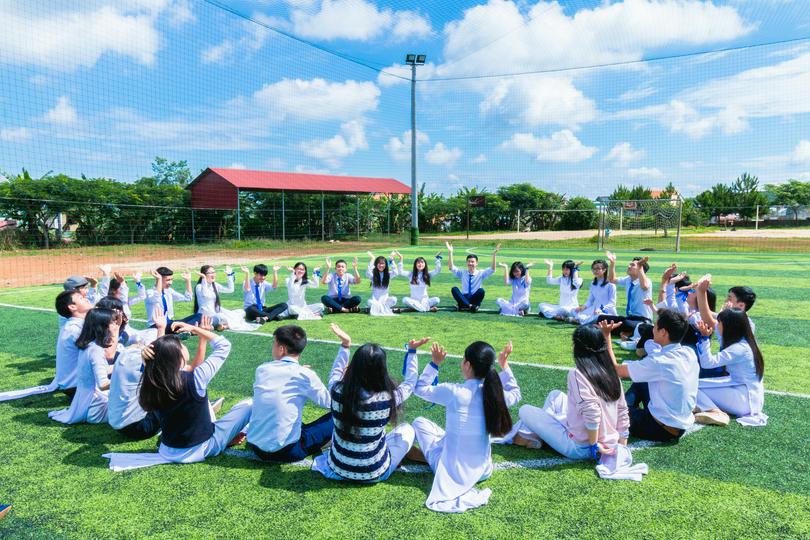If one were to witness the final day of this camp, they might find it hard to believe how shy and anxious the participants were at the start. Recently, a church in southern China hosted a two-and-a-half-day faith camp for youth, drawing in over 50 young people from all over the country. During small group sessions, some individuals were moved to tears in prayer, while others courageously shared their deepest struggles. As they embraced one another, you could see a spark of hope in their eyes. Just two days earlier, however, these young people had been sitting quietly apart, keeping to themselves.
They came for all sorts of reasons—some were signed up by their parents and attended reluctantly to fulfill an obligation; others were enticed by the idea of "making money," while a few sought to step out of their comfort zones and explore new social experiences.
The camp commenced promptly at 7:00 pm on Friday. Participants entered the venue in succession, greeted by the worship team on stage, who welcomed them with song. The worship leader encouraged everyone to stand and raise their hands in praise, but the response was pretty subdued.
A young woman in her early twenties sat directly across from the podium, her cheeks flushed with both nervousness and heat, her clothes already damp with sweat. She stood up hesitantly, her eyes darting around the room, anxious about making a misstep. When the worship leader invited everyone to raise their hands, she lifted hers only halfway to her chest, as if seeking comfort in the gesture. This sense of awkwardness was not unique to her; it was reflected in nearly every young person there.
Following a brief worship session, the group engaged in an ice-breaking activity. Everyone in the five groups took turns introducing themselves, picking a group name, and coming up with a slogan. But when the group leaders offered suggestions, participants exchanged shy and hesitant glances, with no one willing to speak first. Ultimately, the group leader had to break the silence.
At that moment, a palpable distance remained among the young people, as they participated passively.
The transformation began the next day. Over the following two days, participants attended one or two video lessons each morning, afternoon, and evening, interspersed with games, tea breaks, and prayer practices. After each lesson, there would be group discussions, and then each group would send someone up to share their thoughts on stage. During these presentations, the host encouraged the audience to cheer for the speakers with a loud "XXX, you're awesome!" This seemingly simple encouragement gradually helped some participants to find their voices.
During tea breaks, those who had previously retreated to the corners began to engage more openly. Some ventured to try the snacks, and group leaders would gently ask some of the others, "Would you like a cup of tea?" These small gestures helped everyone feel more connected.
The sister, who had been blushing with nervousness at first, was moved to tears during the evening prayer meeting. She was not great with words, but she started showing her care for others through her actions—helping those around her and sharing what she had.
Another young sister bravely opened up about her struggles: the pressures of job hunting, the pain of a family member's illness, and her feelings of helplessness. These were things she had never shared with strangers before.
"I usually get really anxious and nervous in public, but now I'm feeling a lot better," shared one brother during the final group session, and everyone nodded in agreement. Many others opened up about how much they had changed during the camp, attributing their progress to the love and acceptance they found here.
These transformations were fueled by the small, everyday efforts of the staff. They ensured that cups were promptly refilled after participants left their seats, and meals were prepared with care by the kitchen team, who even included thoughtful small gifts. Group leaders remained attentive to those who tended to hide in the corners, bringing them cookies or a few kind words. During tea breaks, the pantry table was always overflowing with delicious snacks and beautiful fruit platters. Each time participants entered or exited, the staff lined up to warmly welcome and bid farewell. All this love was tucked away in the little details.
One young sister, who initially joined the camp with the intention of "earning some money," shared during the testimony session: "After being here, I've come to realize that money isn't what matters. I've found love and friendship. Some people actually listen to me, and some who want to spend time with me. I even want to fix my relationship with my mom."
Even when some participants were napping face down on their desks during the afternoon sessions, the group leaders did not wake them up; they just stood quietly by. That kind of acceptance felt really comforting.
At the end of the camp, the pastor admitted, "Honestly, we were quite concerned at first about whether everyone would adapt. We prayed for this gathering two months ahead of time. And seeing how everyone has changed today, we know God has heard our prayers." Two and a half days might not seem like a long time, but it showed that young people do not resist the Christian faith; they just fear being judged and feeling out of place in unfamiliar environments.
As stated in 1 John, "We love because God first loved us." Engaging with young people may not require additional rules; instead, it calls for a heart that is open to love, serving, and accepting them.
Originally published by the Gospel Times
- Edited by Katherine Guo and translated by Joyce Leung












